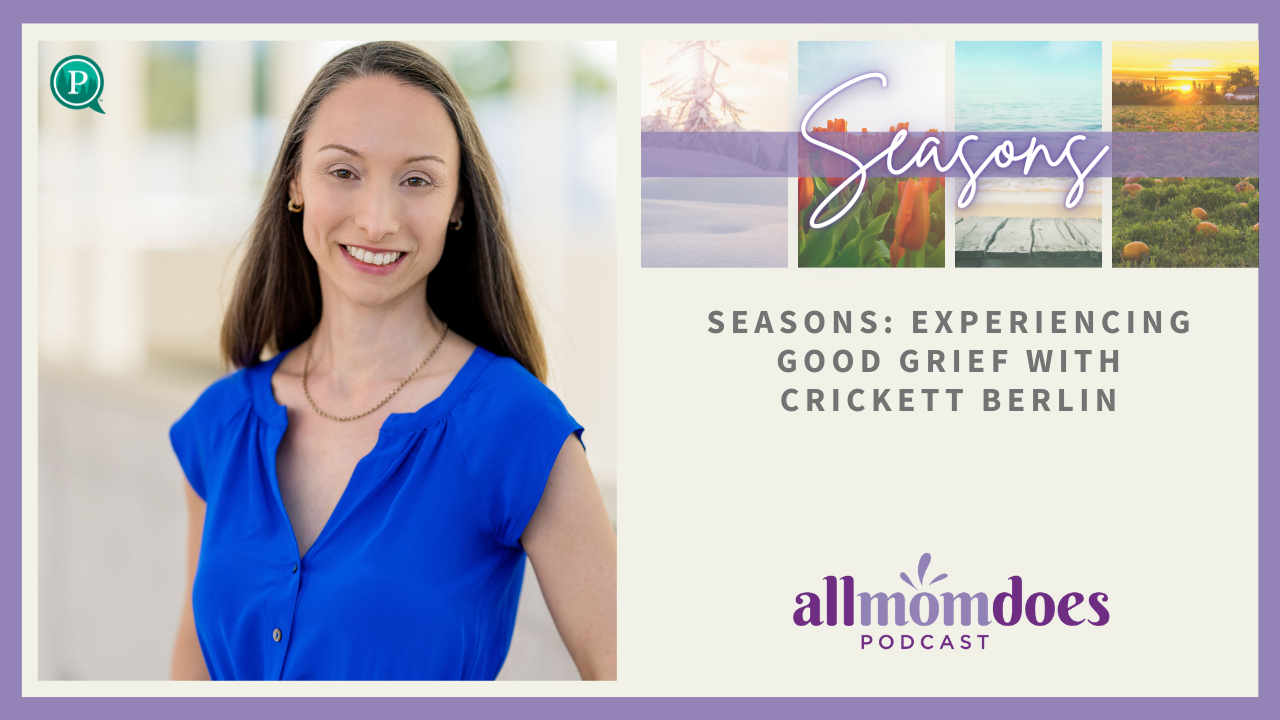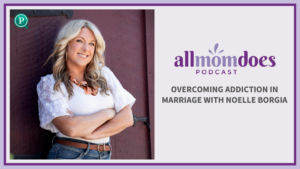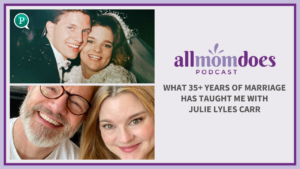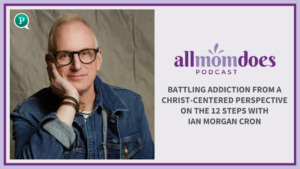Crickett Berlin spent years as an ICU and hospice nurse and is now launching into a new season of her career as a grief therapist. She shares compelling insights into living and letting go in this episode with AllMomDoes Podcast host, Julie Lyles Carr.
Interview Links:
- Find Crickett Online | Facebook | Instagram
- Hyde Park Counseling Center
Transcription:
Purposely. Your life. God’s purpose. Listen at onpurposely.com.
Julie Lyles Carr: Today on the All Mom Does podcast, we’re continuing our series on seasons, and I’m in a season of some laryngitis, so I’m gonna sound a little husky. Sometimes people like that, sometimes they don’t. Let’s just roll with it and let’s see what happens. I have my dear, just much adored friend, Cricket Berlin on the podcast today. Cricket has had a very varied career in all kinds of places that a lot of us, you know, we fear to go, and she has some incredible wisdom for us about the emotions that we encounter when seasons of life change. Cricket, thank you so much for being with me today.
Cricket Berlin: Thank you for having me, Julie. I’m excited.
Julie Lyles Carr: I love for my listeners to get to know my guests a little better. So, tell my listeners where you live and tell ’em about Maverick and Jet and your husband. Fill listeners in on all that.
Cricket Berlin: Yes. All right. So, I live in Austin, Texas. Used to live right next door to Julie. What a blessed,
Julie Lyles Carr: Yes, you did. Yes, you did.
Cricket Berlin: time, that was. So, I am married, almost 16 years, and we’ve got two beautiful boys, Jet and Maverick. And I have spent most of my life walking through many various seasons that have resulted in a lot of grieving. But I didn’t realize that that’s what I was going through at that time. But before we get into that, I’ll kind of back up and say that I started out my career as a registered nurse. I started working in critical care ICU, and I really found that my passion was for those going through end-of-life care, palliative care. So, I transitioned into hospice nursing, and I really didn’t understand at that moment that God was really preparing me and training me for where I am now. I ended up losing my sister in 2017 to ovarian cancer, and that was a really difficult time. That was the first time that I had lost somebody who was so close to me. Then we had the dreaded 2020.
Julie Lyles Carr: Oh, yes.
Cricket Berlin: And I ended up losing a very dear Aunt of mine. And then a few months after that, I lost my mother, and a few months after that I lost my father-in-law. And so that was just a very, very difficult, heavy season. But there are a lot of other seasons I’ve been through that resulted in a lot of, just kind of wondering, like, what is going on Lord? I’ve had a lot of physical illness, I suffer from chronic migraines, fibromyalgia. And so, I’ve kind of walked through this season of not being the parent that I thought I was going to be. I’ve walked through some difficult seasons with my children as well. I have my first son, who I said was a very spirited young child. Did not expect parenting to, to be the way it was when it started out. And that was a difficult season that I had to wrestle with. And then of course, just seasons walking through, with my own marriage and just finding myself, finding who I am as a wife, who I am just as a person, as I grow and mature in my own life. And so there have been just a multitude of seasons that I’ve walked through, and I’ve really found a passion for walking with others who are also going through these varied series, seasons and thinking what in the world is going on? What, what in the world am I experiencing?
Julie Lyles Carr: You know, when seasons are difficult, or when seasons are not what we expected, we can have a lot of emotion come up. And I think so often we preserve the word grief for what we think of following the loss of someone, you with the losses of close family members over the last few years, same for me, this whole place of grief. Like that’s the word. And in an interesting way, having that word helps us identify what we’re feeling. However, when I look at how people feel when their kids leave for college, or when I look at how people feel when they’re exiting a season that they have loved and they’re heading into something that’s rather unknown or feels kind of lonely or uncertain, sometimes we don’t always have the word for what that is. And yet it is a form of grief, isn’t it?
Cricket Berlin: Absolutely is. And, and I think that you hit the nail on the head when you say we don’t have the word for it. And when we don’t have the word, when we don’t kind of, you know, we all, we, we, we live in a society where we hate labeling things, but sometimes I think when we put the label of grief on it, it gives us a sense of comfort. We say, okay, now I understand what it is that I’m going through. And you’re right, we think of grief as just death loss and it’s, it’s so much more than that. It’s, we can have grief over those moments of just regular life transitions. Maybe you’re transitioning from being a stay-at-home mom to a working mom. Maybe you’re transitioning from being a working mom to a stay-at-home mom. Maybe your marriage is going through something. Grieving can be even over happy events. It’s like we see our children graduating. You know, moving out of the house and this is a joyous time, but at the same time, we are going through such a big transition that there is a moment of grief that we’re leaving a season behind and entering into a new season. And we don’t necessarily need to meet, make grief the enemy. I think if we can make it a friend in those times and we put that label on it, we can understand what it is we’re going through. And we have a clearer path as to how to navigate the season.
Julie Lyles Carr: What are the contours of grief that we should be looking for? You know, we all hear the five stages of grief, however, thankfully within psychology and human understanding, we’re always expanding our knowledge base. And just because something was taught to us a certain way, or it’s gotten a certain gear that it’s just gone into sort of the public consciousness as the way that things are supposed to be done. That doesn’t mean that in our educational systems and with researchers, we’re not finding out new things about how we process change and the emotions that come either through moving from season to season from one thing we’ve loved to something that’s different, or even the big ones that we talk about. When we talk about death loss grief, what are some of the new things we’re learning and, and where can leaning so hard into the five stages of grief? In terms of our understanding become problematic.
Cricket Berlin: Yeah. That’s a great question. So first I wanna just name the five stages just in case somebody’s like, what is this five stages business? So that comes from Elizabeth Kubler Ross. And she worked with people who were going through terminal illness and who were passing away in the hospital. But she also followed their families, and she came up with this model called the five stages of grief. That’s, that we moved through denial, we moved through anger, we moved through bargaining, we moved through depression, and then we arrive at acceptance.
There’s also new models. There’s a gentleman named James Warden who has the five tasks of grief. He didn’t like the stages so much. He felt like it was a little passive that you kind of were moving through this without any, any sense of direction or will, in that it really took autonomy away from the griever. And so, he came up with these five tasks. They’re accepting the loss, processing the pain, adjusting to your new reality, and continuing the. There’s other models of grief. There’s one called, Dual Process where it’s like we oscillate between grieving and not grieving. And the theory is, is that we can’t constantly grieve, we have to have this protective mechanism. But this is the problem with trying to grieve through a model. That’s more for the professionals to pontificate grief and talk about grief, right. It really doesn’t help the griever. And in fact, it can be detrimental because then they can feel like, wait a minute, I thought I moved past that stage, or I thought I’ve accomplished that task. Why am I back here in the anger again? Why do I feel like I’m processing this pain again? We have to really understand that grief is not a linear process that we go back and forth. Things can retrigger our grief, anniversaries, birthdays, lost expectations. And so, it can really cause almost a detriment to the griever to try to make sure that you’re going through this grief in a, in a particular way. Because again, like I said, it can cause you to think, am I doing this correctly or what’s wrong with me? So, we need to kind of, it’s okay to understand that those concepts are there, but to also be careful not to get stuck on that we’re moving through this grief process in a, in a prescribed way.
Julie Lyles Carr: Right. You know, one of the things that I hear people talk about, and I know this was a question in my own mind in certain seasons is, well, how long is this grief season going to last. Yeah. And so, to have these five stages or five tasks, I think sometimes helps people feel like they can stay to timeline. Sure. But that season is a little more amorphous than maybe we would like. What, what do you tell people when they say, well how long am I gonna feel this way?
Cricket Berlin: There’s not an answer to that, honestly. And I hate to say that because it really kind of feels hopeless to be like, I don’t have an answer for that. The thing is, is that. You know, when we grieve, usually it’s because we’re wounded. And from my nursing background, right, I think of it as a healing process, but sometimes those healing processes, we still end up with the scar. The wound has healed, the skin has grown over, but yet we still have that scar there, that remembrance. And that’s not necessarily a bad thing. Again, I think if we can shift grief and reframe it as, it’s not the enemy. That it can become a friend that there’s a way that we can use this to grow ourselves. Not just grow ourselves, but grow ourself to be a conduit of God’s grace, to others who are also going through grief. So, there’s really not a timeline and there’s not an end point. And I think if we’re looking at death loss, we have spent years. Think of for an example, a woman who has been married for 50, 60 years. There is no end point in her probably grieving her husband. We were created to remain connected. And how do we use it and how do we grow from it? Rather than worrying about an endpoint.
Julie Lyles Carr: Cricket, how do we avoid what I would call comprable grief or comparable grief? And what I mean by that is this, you know, there’s always somebody that we can find out there who’s had a worse experience. Even in some of the most tragic things that we may face, or we may know about, there’s always somebody that there’s something even harder going on. And when we’re in seasons where we’re exiting from, let’s say what we now call colloquially “empty nest syndrome”, you know, and yet that really is a grief. There’s a loss there. There’s a, there’s a joy there and there’s a loss there. Sometimes I can find myself trying to talk myself out of how I’m feeling, because I can find somebody who is going through something that’s deeper, harder, more difficult. Does that serve us well? Or is that a way that maybe we’re avoiding? Does it help give us perspective? What do we do with that?
Cricket Berlin: Yes, that is a very, that can be very real where we kind of get into this grief competition almost, where we almost use our grief as a badge of honor. And so, we think, well, we wanna almost sideline somebody else’s grief because it’s not as bad as what we’ve been through. And we put our, our grief up on this pedestal, and that can be a very dangerous place because then we lose empathy and compassion for others. Some important things to know about grief are that it’s personal and it’s unique. And that’s a beautiful thing in that it’s personal in the sense that I am going to grieve differently than my husband. We both in 2020, lost a parent. I lost my mother and my father-in-law. He lost his father. We grieved that loss differently, but it’s also unique in that you’re going to grieve each loss differently. So, when I lost my aunt, I was grieving differently than the way I lost my mother, and there’s varied reasons for that. But the, the trouble is, is that we then think, oh, well, I’ve lost my mother, so I must know how you feel. Or this way I processed my, processed my grief in losing a parent or losing a child, so this is how you should process your grief. So, we have to be very careful that we don’t use grief as a badge of honor, that we don’t get into this grief competition, but we also recognize that grief is personal and unique for everybody. And so, we need to honor the fact that they’re going to grieve the way that God has created them to grieve. They’re going to struggle in their own unique way, and there’s different reasons for that. But give them space for that and allow the uniqueness and the personal experience that they’re having that maybe differs from yours.
Julie Lyles Carr: You know, Cricket, it makes me think of scripture where we’re told to grieve with those who grieve. And the interesting thing is, that’s the perfect formula for what is true empathy. You know, true empathy is not saying, oh I felt that, so I know how you feel. True empathy is coming alongside someone and just letting their feelings be. Experience it through them and not have commentary, not have any kind of, well this is the way I did it. And anytime we slide into talking about our own experience, it’s not wrong. It’s not bad to share something we’ve been through, but we are now no longer sitting in the seat of grieving with someone who’s grieving. We have now moved into a seat of being a commenter, on moving into something that is more sympathy, but it’s not true empathy. It doesn’t really fulfill, in my opinion, the point of that scripture about grieving with those who grieve. Cricket, how do we know when we need to think about getting some help? Because grief can be so overwhelming, whatever it’s over. I’ve had friends who, with their kids going to college just really went to pieces. I mean, it really, they really struggled. I’ve had friends who, when their child started kindergarten, it turned into a three- or six-month journey that was really, really tough. And then of course, friends and myself who have gone through death loss, that is a different journey. But because grief is so encompassing, because it’s so unique. How do we know when we need to get some help? How do we know when it’s beginning to take us over in a way that is no longer serving us as a friend and as a place to process, but it’s crossed into something that really is not good for us.
Cricket Berlin: That is an excellent question, and I wanna speak directly to the listener. This is for you. That if you feel like, I need help, get help. It’s simple as that. Again, I don’t wanna put a formula on it. I, there’s not a, a prescription for it of if you meet this criteria, that you then seek out a professional counselor or pastoral counseling. If you feel like you need help, please go get help. The Lord has created counselors who have this passion and who have the expertise to help you. And it may not be that it’s pathological grief. There is something that moves more into that area. But if there is a need to speak to somebody, don’t worry about whether it’s pathological, or whether you’re entering into a major depression, just go get help. The therapist or the pastor, they’re trained to recognize these red flags, these concerns. And they can kind of direct you a little bit more, because grief can be all consuming that it can feel pathological. And we forget that grief is a normal, natural process, but we’re not meant to grieve alone. So, it’s okay to reach out for help, even if you feel like it’s something minor, like, why am I so upset that my child just entered kindergarten? We’ll go talk to somebody. Reach out to somebody in the church, reach out to somebody in, in your community that is experienced with these things.
Like I said, it’s all consuming, the Bible says that we’re created with body, heart, mind, and spirit. And so, a lot of times people talk about these life quakes, because it feels like an earthquake. You’re like, why am I feeling so overwhelmed? You’re going through a huge transition. We have, you know, like I said, it affects us mentally. We can have these negative thoughts. We can have difficulty even thinking. We feel like our brain is just mush. We’re forgetful. We can feel numb.
We have the emotional, right? The heart. We can feel sadness, anger, guilt. We have the spiritual side of us where we question, God why is this happening? You know, or we feel that He is punishing us somehow. We have the physical. You know, where we have loss of appetite, or maybe we’re eating too much, or we’re not sleeping, or we feel nauseous. We’re having headaches. So, it’s, it’s all consuming, it’s all encompassing. And if you feel like, I need to talk to somebody, if that’s a thought that runs through your mind, go talk to somebody. Talk to somebody who understands these things and can let you know, you’re okay, this is normal, you’re grieving. Or they can pick up on some red flags. On the flip side of that, the one, the number one thing that I would say you absolutely need to reach out to somebody is if you start feeling like, I can’t go on. I can’t go on in my life without this person. Or I can’t go on in my life without what, what I’ve just lost. If you are having at all, any suicidal ideations or thoughts, please immediately reach out to somebody.
Julie Lyles Carr: Cricket, I find so fascinating in your personality, you’re one of the most adventuresome people I know. You go on more trips; you go to more corners of the world. I mean, keeping up with you through your Instagram account and through conversations we have and getting to sort of vicariously travel alongside you, from a distance, if you will. You are just so full of joy. You’re always looking for the next fun thing, the next great thing to learn. And yet you have made a career out of being in extremely traumatic places; the ICU, hospice, and now you’re finishing up your clinicals as a grief counselor. What is it in you that is drawn to helping people in those places? Because I have to be honest, you know, one of my degrees is in psych, and I pastored for a very long time and certainly there are places that I ran into those same kind of arenas to some degree, but it was different. It was not 10 hours on the ICU floor. It was not those moments that are just so saturated in what’s going on an hour after hour. Talk to me about a personality style that has such joy for life, and yet is willing to crack your heart open again and again, to come alongside people and treat them clinically, both from a physical perspective and now from an emotional and spiritual perspective.
Cricket Berlin: You know, it took me a while to realize that God created me to be a caregiver. That is just like my natural go-to, that’s my niche. I love caring for people. I think a lot of it had to do with the fact that I have also experienced a lot of trauma in my life. I’ve gone through a lot of difficult things growing up. I’ve entered into many different seasons that were very difficult for me. I suffer from, like I said earlier, some health issues. I also suffer from some mental health issues, and that’s anxiety. I’ve experienced several bouts of depression. So, I have walked through the fire, I feel like. But I’ve also received restoration. I am not completely healed, and I don’t expect to be healed on this side of heaven, but I know, and I trust and have hope that one day I will. And so I think that the Lord has equipped me with this ability to be comfortable with the uncomfortable. He’s given me the ability to feel comfortable, not just going to him and screaming out. Where are you, Lord? And me recognizing, oh, okay, that’s right. You never left me. Never mind. But also, being able to walk with others who are going through that. And so that’s just where my passion is. And I feel like the Lord has equipped each and every one of us with a unique gift. And this is my gifting and I feel honored and obligated to serve his kingdom this way. So that’s why I’m so passionate for reaching out to others and walking with them through very difficult seasons of life.
Julie Lyles Carr: Cricket, talk to me about the permission we sometimes need to give people to grieve in places where maybe it doesn’t feel quite correct. And here’s what I mean by that, that place where sometimes we come up with a lot of platitudes and it’s almost like we make grief an unacceptable emotion to feel. You know, in my case, when two of my children were identified as being differently abled, I pretty quickly got to the place where I found mission and purpose, but I can also remember feeling guilty that I was having this emotion that might feel like grief. Because I absolutely love them for exactly who they’re created to be. And I never wanted them to feel like there was anything less than that from me. So, there are places and times where I feel like we need to know it’s okay to grieve. Even if it feels a little weird, how do you help people give themselves the permission in certain circumstances, in which we so quickly wanna move people to, oh but here’s the nobility of this thing, or here’s the purpose of this thing, or here’s why you’re gonna be able to help so many other people with this thing. How do we give people the permission to feel that feeling, and hold space for both, that they can be entering a season that is going to be really powerful and very meaningful, but it’s okay to grieve coming into it. How do we do that for people? How do we do that for ourselves?
Cricket Berlin: You know, I would probably answer that with the fact that God gives us permission to grieve. If he gives permission to grieve, then we should extend that grace to someone who’s grieving as well. And we see that through the Psalms. The Psalms really are Psalms of grief. I mean, if there isn’t a Psalm that addresses the type of grief or season that you’re going through, it certainly addresses kind of how we should respond to grief. I mean, we’ve got Psalms that cover death loss, we’ve got Psalms that cover grief over personal sin, we’ve got Psalms that cover the evilness in the world, our enemies. So, there’s, the Psalms really are just these songs of grief. And so, if the Lord gives us that permission to grieve, then we should extend that permission to ourselves and to others.
Julie Lyles Carr: That’s such a great perspective because I think sometimes, we can get in a very interesting place spiritually, where we feel like we’re only supposed to be happy and confident and hopeful and full of faith. And we forget that our emotions were created by God. Our emotions were extended to us by him. How we use those emotions is important, and there’s responsibility for our actions based on some of those emotions. But you’re so right. I mean, he gives us that permission, and then he gives us these beautiful models of how people walk this process and what it means. And we have that through scripture. I think that’s an incredible way of looking at that. Cricket. What can we do to take care of ourselves when we’re in a season of grieving? And let’s say, we feel like we’ve accepted it, we’re walking alongside it, we’re moving through it, we’re getting help if we need it, we’re, we’ve got trusted people we’re around. We feel like in that way, we are walking through a healthy grief, but what do we need to be on the lookout for on how to take care of ourselves holistically? Because as you said, we are people of our bodies, our minds, our souls, our spirits. How do we make sure that we are both giving ourselves the room to grieve well, but that we’re also taking care of ourselves?
Cricket Berlin: Yeah. Well, and you, you kind of addressed it already that we’re made with the body, we’re made with the mind, we’re made with the heart, we’re made with the spirit. And so, we have to make sure that we’re addressing each and every one of those. So, like with the mind, we have to watch the thoughts that we’re allowing to process through our mind. Are we having negative thoughts? Are we having positive thoughts? It’s okay to have negative thoughts sometimes, but we also need to be careful of how many negative thoughts we’re having and where those negative thoughts are leading us, and how we’re responding behaviorally to those negative thoughts. We need to make sure that we’re taking care of our body physically. Are we eating healthy? Are we exercising? Are we just getting out and getting some sun? Are we drinking enough water? We need to make sure that we protect our heart. We need to allow space to grieve, but we also need to allow space for joy. Right? We grieve, and we rejoice at the same time. So, we need to make sure that we’re doing both. Our spiritual side, we need to make sure that we’re staying connected with God. It’s okay to be angry with him, but be angry WITH him, not away from him. We need to make sure that we’re, you know, staying in our Bible, we need to make sure that we’re connecting. If we’re having a hard time praying and reading our Bible, listen to worship music. There was one night, a perfect example where I just felt like I couldn’t even pray. I was grieving so hard, I couldn’t even get out a word other than, God. And so, I put on worship music, this was like two in the morning. Because I could follow along and sing to the words, they weren’t me having to come up with them because my mind wouldn’t, couldn’t go there.
You know, reach out to other women that maybe you’re connected with, let them pray over you, if you feel like you can’t pray. So we need to address and make sure that we’re caring for ourself in those each categories; body, mind, spirit and heart. And so, we also need to reach out to our doctor. It’s okay. If we’re having a hard time with sleeping, we’re losing weight maybe, or we’re gaining too much weight or we’re feeling like maybe this is moving into a depression, reach out to the professionals. Whether that’s your, your general practitioner or whether that’s a counselor so that they can walk alongside you through this and make sure that you know, that you are medically taking care of yourself as well.
Julie Lyles Carr: Cricket gets so many great thoughts, such great wisdom on how to walk well through seasons of grief. Something we don’t often think about how to walk through in a healthy way. Something we often don’t think about, and the permission to feel that feeling of grief, even if it isn’t something that seems cataclysmic. Such great wisdom, Cricket Berlin. Where can listeners find out more about you and the work that you do? Tell us where to go.
Cricket Berlin: Okay. Well, I have, this is all new, this is all a budding. I like to call it a ministry, but, you can find me on Instagram at Peaces of Grief, peaces as in P E A C E S.
Julie Lyles Carr: Oh, I love that. Yeah.
Cricket Berlin: Want to give the Lord’s peace to a griever. I wanna give that safe space that you can come and lay those burdens at the cross. This is not just for death loss grief. This is gonna be for all grief. So, you can find me at Peaces of Grief on Instagram. I’m in the process of setting up a website right now, it will be CricketBerlin.com, so you can find me there. If you go at this moment, you may not see it, but it should be coming up in the next few weeks.
I’m also starting my clinical internship hours for my master’s degree in counseling. I’ll be at Hyde Park Counseling Center. Let me say that again, I’ll be at Hyde Park Counseling Center. I will be under the supervision of Dr. Nicole Fitzpatrick. So, I will be starting that in August of 2022. You’ll be able to find me there. And I would just love to hear from you.
Julie Lyles Carr: That’s fantastic, and we’ll have Rebecca get those links in the show notes so people can go and find you, hear more about this beautiful approach that you have, to walking alongside people who are in the hard places. Cricket Berlin, I’m so blessed to call you friend. And I know that you are gonna be such a blessing to others as you launch into this next iteration from ICU nurse to hospice nurse, and now as a grief counselor. You are just simply incredible. Thank you so much for all you do.
Cricket Berlin: Thank you for having me.
Follow this podcast:







